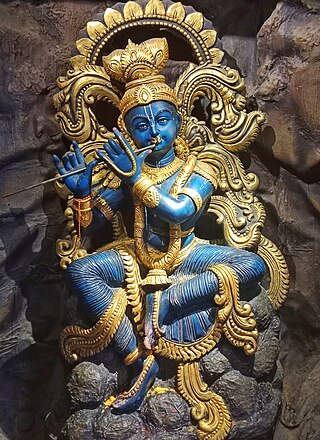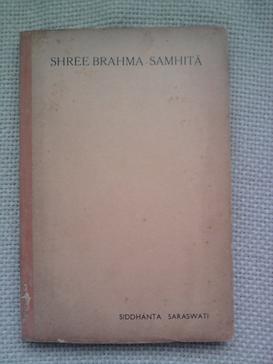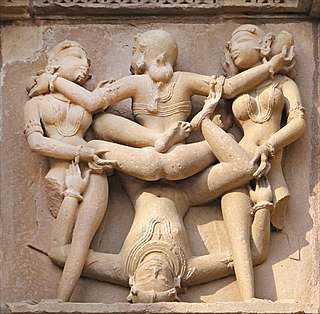Related Research Articles

The International Society for Krishna Consciousness (ISKCON), known colloquially as the Hare Krishna movement, is a Gaudiya Vaishnava Hindu religious organization. It was founded on 13 July 1966 in New York City by A. C. Bhaktivedanta Swami Prabhupada. Its main headquarter is located in Mayapur, West Bengal, India. It claims around 1 million members worldwide.

The Hare Krishna mantra, also referred to reverentially as the Mahā-mantra, is a 16-word Vaishnava mantra mentioned in the Kali-Saṇṭāraṇa Upaniṣad. In the 15th century, it rose to importance in the Bhakti movement following the teachings of Chaitanya Mahaprabhu. This mantra is composed of three Sanskrit names – "Krishna", "Rama", and "Hare".

Govinda, also rendered Govind, Gobinda and Gobind, is an epithet of Vishnu and is also used for his avatars such as Krishna. The name appears as the 187th and the 539th name of Vishnu in the Vishnu Sahasranama. The name is also popularly addressed to Krishna, referring to his youthful activity as a cowherd boy.

Gauranga is another name for Chaitanya Mahaprabhu, the 16th century founder of Gaudiya Vaishnavism. The term Gauranga Mahaprabhu references Chaitanya possessing the golden complexion of the goddess Radha as an avatar of Krishna.

In Hinduism, Achyuta is an epithet of Vishnu and appears as the 100th and 318th names in the Vishnu Sahasranama. It is also often used in the Bhagavad Gita as a personal name of Krishna. According to Adi Shankara's commentary on the 1000 Names of Vishnu, Achyuta means "one who will never lose his inherent nature and powers". The name also means "immovable", "unchangeable", and as such is used for "the one who is without the six transformations, beginning with birth".

Mukunda Goswami is a spiritual leader (guru) in the International Society for Krishna Consciousness.
The Kali-Santarana Upanishad, also called Kalisantaraṇopaniṣad, is a Sanskrit text. It is a minor Upanishad of Hinduism.
Contributions to popular culture involving direct reference to the Hare Krishna mantra include the following.

The Radha-Krishna Temple is the headquarters of the International Society for Krishna Consciousness (ISKCON) in the United Kingdom since the late 1960s. It was founded in Bury Place, Bloomsbury, by six devotees from San Francisco's Radha-Krishna Temple, who were sent by ISKCON leader A.C. Bhaktivedanta Swami Prabhupada to establish a UK branch of the movement in 1968. The Temple came to prominence through George Harrison of the Beatles publicly aligning himself with Krishna consciousness. Among the six initial representatives in London, devotees Mukunda, Shyamsundar and Malati all went on to hold senior positions in the rapidly growing ISKCON organisation.

"Govinda" is a song by British rock band Kula Shaker, released on their debut album, K (1996). Sung entirely in Sanskrit, the song includes Indian influences and tambura and tabla instrumentation. "Govinda" was issued as a single on 11 November 1996 and peaked at number seven on the UK Singles Chart.
"The Lord Loves the One (That Loves the Lord)" is a song by English rock musician George Harrison, released on his 1973 album Living in the Material World. Like the album's title track, it was inspired by the teachings of A.C. Bhaktivedanta Swami Prabhupada, founder of the International Society for Krishna Consciousness (ISKCON), more commonly known as the Hare Krishna movement. The song is an uptempo rock track with elements of blues and gospel. Some commentators have described it as the musical highpoint of Living in the Material World, with Harrison's slide guitar playing singled out as being among the finest performances of his career.

The Brahma Samhita is a Sanskrit Pancharatra text, composed of verses of prayer believed to have been spoken by Brahma glorifying Krishna.

Kṛṣṇa, the Supreme Personality of Godhead, also known as the KRSNA Book, is a summary and commentary on the Tenth Canto of the Śrīmad Bhāgavatam by A. C. Bhaktivedanta Swami Prabhupada, founder-acharya of the International Society for Krishna Consciousness (ISKCON). It was published in 1970 by the Bhaktivedanta Book Trust. The publication was financed through a contribution of $19,000 from Beatle, George Harrison, who also wrote the book's foreword.

Radha Ramana is one of the combined forms of the Hindu deities Radha and Krishna, besides their BankeBihari and Radha-Vallabha forms.

Hare Krishna views of homosexuality, and especially the view of the International Society for Krishna Consciousness (ISKCON) towards LGBT issues, are similar to their views of heterosexual relationships, i.e. because the living entity is identifying with the body, any attraction based on the desire to gratify the body and its senses is symptomatic of illusion and can be purified by progressively elevating the consciousness. Put simply, both hetero- and homosexual attraction is due to an illusory attachment to the temporary body. Same-sex relations and gender variance have been represented within Hinduism from Vedic times through to the present day, in rituals, law books, mythical narratives, commentaries, paintings, and sculpture. The extent to which these representations embrace or reject homosexuality has been disputed within the religion as well as outside of it.
"It Is 'He' " is a song by English musician George Harrison, released as the final track of his 1974 album Dark Horse. Harrison was inspired to write the song while in the Hindu holy city of Vrindavan, in northern India, with his friend Ravi Shankar. The composition originated on a day that Harrison describes in his autobiography as "my most fantastic experience", during which his party and their ascetic guide toured the city's temples. The song's choruses were adapted from the Sanskrit chant they sang before visiting Seva Kunj, a park dedicated to Krishna's childhood. The same pilgrimage to India led to Harrison staging Shankar's Music Festival from India in September 1974 and undertaking a joint North American tour with Shankar at the end of that year.

The Radha Krsna Temple is a 1971 album of Hindu devotional songs recorded by the UK branch of the Hare Krishna movement – more formally, the International Society for Krishna Consciousness (ISKCON) – who received the artist credit of "Radha Krishna Temple (London)". The album was produced by George Harrison and released on the Beatles' Apple record label. It compiles two hit singles, "Hare Krishna Mantra" and "Govinda", with other Sanskrit-worded mantras and prayers that the Temple devotees recorded with Harrison from July 1969 onwards.

Jhulan Purnima,Jhulan Yatra or Hindola is a Hindu swinging festival that is dedicated to Hindu god Krishna and goddess Radha. It is popularly celebrated by the Hindu Vaishnava sect in the month of Shravana (July-August) which falls under the monsoon season in India when the weather is hot, humid and slightly breezy. This festival is known for its display of decorated swings, songs and dance. It is a joyful festival which celebrates the amour of divine couple Radha and Krishna along with the romantic fervor of the rainy season in India.
Yamuna Devi, born Joan Agnes Campanella in Butte, Montana was an American cookbook author, best known for her 1987 James Beard Foundation Award winning cookbook, Lord Krishna's Cuisine: The Art of Indian Vegetarian Cooking. She was also a senior member of the International Society for Krishna Consciousness (ISKCON).
References
- ↑ "George Harrison GOVINDA JAYA JAYA [Prabhupada]". Krishna Books. Archived from the original on 25 July 2011. Retrieved 31 January 2019.
- ↑ Winn, John C. (2009). That Magic Feeling: The Beatles' Recorded Legacy, Volume Two, 1966–1970. New York: Three Rivers Press. pp. 368–69. ISBN 978-0-307-45239-9.
- ↑ Castleman, Harry; Podrazik, Walter J. (1976). All Together Now: The First Complete Beatles Discography 1961–1975 . New York: Ballantine Books. pp. 87, 101. ISBN 0-345-25680-8.
- ↑ "Kula Shaker 20th Anniversary of K". alberthallmanchester.com . Retrieved 7 March 2017.